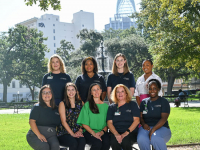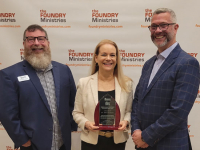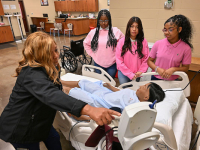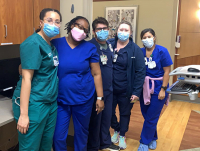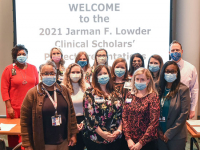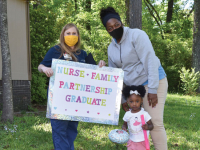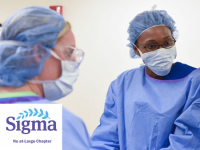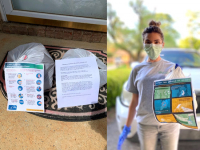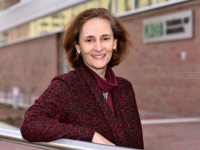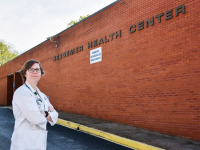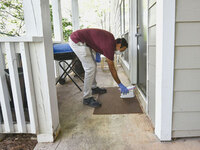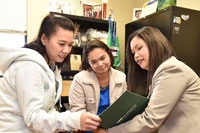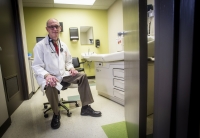The School of Nursing collaborates with Children’s of Alabama, both academically and clinically, to improve care and outcomes for the young people who receive care there. Two nursing faculty members are currently involved in important projects at Children’s that furthers this longtime partnership and are producing powerful results for children, their families and the level of care provided at the hospital.
Improving outcomes in childhood cancer curvivors
 A member of the newly-created Institute for Cancer Outcomes and Survivorship at UAB, Associate Professor Wendy Landier, PhD, CRNP, holds an appointment within the Department of Pediatrics in the UAB School of Medicine, as well as within the School of Nursing. As an internationally recognized expert in pediatric oncology and survivorship care, Landier conducts research focused on improving outcomes in childhood cancer survivors.
A member of the newly-created Institute for Cancer Outcomes and Survivorship at UAB, Associate Professor Wendy Landier, PhD, CRNP, holds an appointment within the Department of Pediatrics in the UAB School of Medicine, as well as within the School of Nursing. As an internationally recognized expert in pediatric oncology and survivorship care, Landier conducts research focused on improving outcomes in childhood cancer survivors.Currently, Landier is involved in several clinical research studies onsite at Children’s. For instance, she is co-leading two studies: one is focused on the factors that influence childhood cancer survivors’ experience with the human papillomavirus vaccine (HPV), and the other study is focused on improving medication adherence in children with leukemia. Landier is also involved in a study to identify and treat children with increased risk of hearing loss due to receiving treatment for neuroblastoma, and another study to understand the effective delivery of patient and family education in pediatric oncology. Because all these research studies are clinical in nature, “there is an opportunity for nursing students at all levels to experience firsthand what it is like to conduct clinical research at Children’s, and to gain skills and experience in pediatric oncology clinical research,” Landier said.
“Dr. Landier’s program of research in childhood cancer survival is an excellent fit with the cancer survivorship programs in the School of Nursing and at UAB,” said Dean and Fay B. Ireland Endowed Chair in Nursing Doreen C. Harper, PhD, RN, FAAN.
In addition to conducting research, Landier is also working with Kim Whelan, MD, MSPH, and Smita Bhatia, MD, MPH, to expand the Taking on Life After Cancer (TLC) Clinic at Children’s, which provides specialized long-term follow-up care for childhood cancer survivors.
“The overall goal of this clinic is to provide a health promotion focused, follow-up clinic for childhood cancer survivors that gives them the knowledge, tools, and specialized care that they need to maximize their health potential both during childhood and as they move into adulthood,” Landier said.
Because Children’s has an outstanding history of commitment to pediatric oncology research, Landier says her work there is a perfect fit.
“I look forward to a long and rewarding collaboration with Children’s and the School of Nursing through the conduction of high-quality clinical research, which will include both Children’s Oncology Group-affiliated studies as well as investigator- initiated work,” she said. “Through this research, we will have the opportunity to learn from our patients and families and to address important gaps in knowledge in the field of pediatric oncology; together, we can move the field forward.”
Preparing nurse scholars
In addition to supporting ongoing research at Children’s, faculty members are teaching onsite nurses to organize and conduct their own evidence-based projects through the Clinical Scholars Program, a partnership between the School and Children’s of Alabama.
“The goal of the Clinical Scholars Program is to help give nurses more information about developing evidence-based projects and equip them with skills to do so in order to improve quality of care and patient outcomes,” said Associate Professor Gwendolyn Childs, PhD, RN, director of the program.
 In its second year, the Clinical Scholars Program selects 10 nurses for each 12-month cycle. Once a month, the scholars attend a full day of classes taught by the School’s faculty, where they learn about the importance of evidence-based practice and how to conduct it.
In its second year, the Clinical Scholars Program selects 10 nurses for each 12-month cycle. Once a month, the scholars attend a full day of classes taught by the School’s faculty, where they learn about the importance of evidence-based practice and how to conduct it. In the meantime, each participating scholar develops, implements and assesses a project based upon Children’s initiatives and strategic plan. Throughout the year, Childs serves as a mentor and supporter for each scholar and his or her project.
To be selected for the scholars program, nurses must be at least BSN-prepared and a full-time employee at Children’s. Because they are firmly embedded in patient care at Children’s, their projects in evidence-based care are highly relevant and useful to their co-workers and the patients they serve.
For instance, two nurses working in the hematology unit are conducting a project focused on family education about central line changes. “They recognized that kids were being readmitted with central line infections and realized that parents did not understand how to take care of the central line at home,” Childs says. “In this project, the nurses are involving parents at the hospital in taking care of the central line, showing videos, and answering questions while the child is in the hospital. They are hoping this will increase parents’ understanding of how to maintain the line at home.”
“This collaboration brings together the best of the UAB School of Nursing with our Clinical Scholars to provide better care for our children and their families,” said Deborah E. Wesley, RN, MSN, Senior Vice President and Chief Nursing Officer of Children’s of Alabama.
The Clinical Scholars Program, funded by a generous philanthropic donation from The Thomas F. Lowder Family Foundation, is a win-win for the hospital and the nursing school.
“Children’s really wants to see all its nurses involved in research of evidence-based projects,” Childs says. “This program helps nurses improve their skills and participate in evidence-based projects that will improve their practice. Also, by providing our resources to this program, the School of Nursing is helping to improve care and outcomes at Children’s, and we’re also showing nurses how furthering their education can really help improve practice.”

